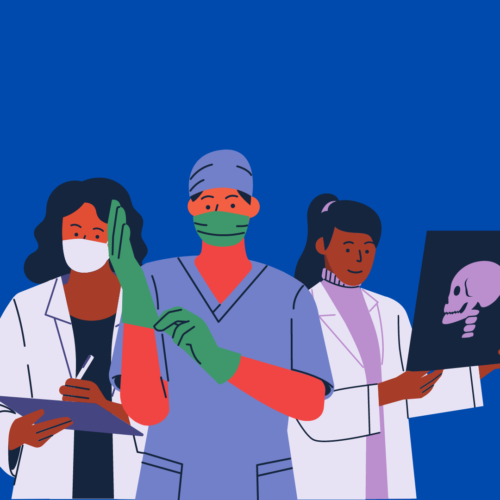Image courtesy of Canva.
Just as Charon ferried souls post-death across the River Styx to receive their fate, death too propelled Jenny Tiskus into her journey with medicine. In “The River Styx,” an appropriately named episode of the podcast The Nocturnists, Tiskus explores gallows humor and how physicians process death. She reflects on the deaths of her father and grandmother and her initial hesitance to go into medicine. Her wandering back between a life with and without medicine feels reminiscent of the wandering souls of the Greek Underworld river, who anticipate the moment when their afterlife fates become clear.
The Nocturnists is a podcast in which healthcare workers share their experiences in the field. Integral to each episode is the art of storytelling. The anecdotes that each guest shares are raw: listeners feel as though they have a special insight into healthcare without having to enter the hospital or clinic themselves. They learn about healthcare professionals’ joys and vulnerabilities while working in the field.
March 2020 marked the beginning of The Nocturnists’ “Stories from a Pandemic” series. This season is particularly moving; though our one-year anniversary since the beginning of the COVID-19 pandemic has passed, all the initial emotions and reactions are still incredibly tangible. The hope, exhaustion, and cynicism that listeners have in common with storytellers grounds the healthcare workers as people like us, rather than sacrificial heroes the media glorifies. “It’s not bad yet. It’s a whole lot of unknown,” recounts a trauma nurse as she marvels at her colleagues’ smiles despite their surging anxious emotions. “[The hospital] sent me home early today because I’m getting too much overtime. Apparently being willing to make sure that our patients get their stuff is too expensive,” reports a Durable Medical Equipment truck driver.
This season, the producers have expanded the podcast to make it a nationwide, collaborative effort. They created an interactive map where each destination features a story from a healthcare worker into which listeners can tune. Usually, the podcast uses music by composer Yosef Munro to open and close episodes. However, the only music featured this season is that provided by the diarists. At the end of “Stories from a Pandemic: New World,” an internal medicine resident details that she picked up music again because it gives her the comfort that uncertainty has often taken away; she closes out the episode playing Dvorak’s New World Symphony on her violin. By incorporating these collaborative components, the producers have elevated this season’s storytelling power, authenticity, and connectedness—an important mission now that we have been so apart.
Looking back on her journey into medicine, Tiskus worries about the “emotional desiccation” that could ensue as her profession exposes her to more death. To combat this, she says it’s important to discuss how to stay in touch with her humanity when gallows humor seems to strip it away. Storytelling through The Nocturnists is how she can more fully emphasize the gravity of the deaths that shaped her path to medicine.

